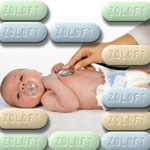Washington Mom Sues Pfizer Over Daughter’s Heart Defect
 A Washington woman recently filed a Zoloft birth defects lawsuit on behalf of herself and her young daughter, claiming that her ingestion of the antidepressant during pregnancy resulted in serious injuries to her child. The case is pending in the U.S. District Court for the Eastern District of Pennsylvania, where it has become part of the Zoloft MDL.
A Washington woman recently filed a Zoloft birth defects lawsuit on behalf of herself and her young daughter, claiming that her ingestion of the antidepressant during pregnancy resulted in serious injuries to her child. The case is pending in the U.S. District Court for the Eastern District of Pennsylvania, where it has become part of the Zoloft MDL.
Like other plaintiffs who have witnessed alleged Zoloft side effects in children, the plaintiff in this case seeks in excess of $75,000 in damages to help cover her daughter’s past and future medical expenses.
Allegations cited in Zoloft birth defects lawsuit
According to the plaintiff’s complaint, she took Zoloft while pregnant, as prescribed by her doctor. She claims to have read the drug information and instructions that accompanied the prescription prior to taking it, and found that congenital birth defects and other serious pregnancy issues were not listed or emphasized in any of these materials, which led her to believe that the Zoloft during pregnancy was safe.
The plaintiff’s daughter was born on March 16, 1995 with life-threatening birth defects. These included a hypoplastic left heart, which required extensive medical treatment including multiple surgeries since the baby’s birth. The mother claims these injuries were a direct result of her ingesting Zoloft while pregnant, and states that if she had known about potential side effects in children, she would have never taken it.
Potential Zoloft side effects in children
Several scientific studies have linked the use of selective serotonin reuptake inhibitor (SSRI) antidepressants to birth defects. In 2006, the New England Journal of Medicine published two studies indicating a connection. In the first, researchers examined nearly 10,000 infants born with birth defects, and nearly 6,000 without. They found that women who took Zoloft during pregnancy had twice the risk of having a baby born with a heart defects than those who didn’t.
The second study demonstrated a similar connection, indicating that mothers who took Paxil during pregnancy (another SSRI antidepressant) had triple the risk of giving birth to babies with heart defects. Another more recent study published in Human Reproduction found that Zoloft and other SSRIs can increase the likelihood that babies will be born with birth defects.
About hypoplastic left heart syndrome
According to the Mayo Clinic, hypoplastic left heart syndrome is a rare birth defect, and describes a condition in which the left side of the heart is critically underdeveloped. This includes the mitral valve, left ventricle, aortic valve, and aorta. As a result, the left side of the heart can’t effectively pump blood to the rest of the body, which puts an extra load on the right side.
In most cases, the right side can manage the job for awhile, but eventually will fail from the strain. Therefore, if the child is to survive, surgeons must first manage the condition by administering intravenous fluids, medications, and breathing assistance. Surgery is then necessary to create normal blood flow in and out of the heart. Such surgery typically requires numerous operations to be completed. In some cases, a heart transplant may be needed. Once the surgery or transplant is completed, the baby will require lifelong care with a cardiologist to monitor his or her heart health.
Plaintiff claims failure to warn in Zoloft birth defects lawsuit
Parents who have newborns with hypoplastic left heart syndrome typically face substantial financial obligations in the care of their children. Those who file a Zoloft birth defects lawsuit typically seek damages to help manage these medical costs, as well as to punish Pfizer for failing to provide adequate warnings about the risks.
The mother in this case states that Zoloft side effects in children were inadequately tested, and the drug was not safe for use in pregnant women. She brings counts of failure to warn, design defect, negligence, negligent design, fraud, constructive fraud, breach of warranties, gross negligence/malice, negligent infliction of emotional distress, and loss of consortium.

